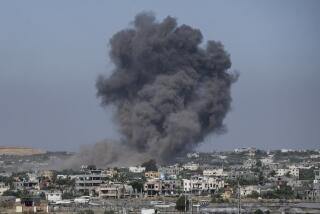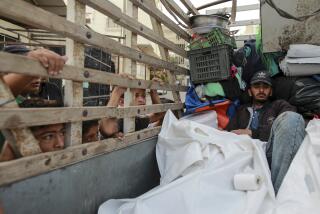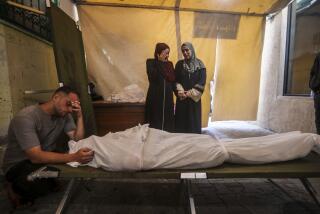Anti-Taliban Forces Report Gains in Positions Near Key Afghan City
- Share via
TERMEZ, Uzbekistan — Anti-Taliban forces reported Thursday that they have strengthened their positions in what a key U.S. commander called a “big fight” underway near the strategically located city of Mazar-i-Sharif in northern Afghanistan.
Leaders of the opposition Northern Alliance described the firefights in neighboring villages as a prelude to an imminent assault on the city that could last two or three days. The opposition leaders said they are eager to take Mazar-i-Sharif before the Muslim holy month of Ramadan begins in about a week, thus securing a crucial corridor for deliveries of U.S. military supplies and humanitarian aid.
“We hope that by [today], we’ll already be on the city outskirts, Allah willing,” said Kuodratullo, a top aide to Northern Alliance commander Ata Mohammed. Kuodratullo, who goes by a single name, was interviewed by satellite telephone from the town of Shulgarah, about 25 miles south of the city.
Haji Muhammad Mukhaqiq, one of the three main Northern Alliance commanders around Mazar-i-Sharif, confirmed that an offensive on the city is in the works but declined to say when it would start.
“We strengthened our positions [Thursday] and are in line of sight of the city,” Mukhaqiq said by satellite phone from Shulgarah. “We spent all day in meetings and [strategy] discussions.”
Army Gen. Tommy Franks, the U.S. commander coordinating the military campaign in Afghanistan, confirmed from Washington, “There is a big fight that’s going on in the vicinity of Mazar.”
Franks said that Northern Alliance control of the city would be key “because it would provide a land bridge . . . up to Uzbekistan, which provides us, among other things, a humanitarian pathway for us to move supplies out of Central Asia and down into Afghanistan.”
Capturing Mazar-i-Sharif, located on a north-south transportation corridor, would also give Northern Alliance troops a base of operations where they could be more easily supplied by the United States. And an opposition victory would provide an important morale boost before winter, when severe weather is likely to stall the fighting.
Franks, making his first appearance at a Pentagon briefing since the U.S. began its airstrikes Oct. 7, declared himself “well satisfied” with the campaign so far.
Military and congressional critics, including former Defense Secretary William S. Cohen and Sen. John McCain (R-Ariz.) have assailed the plan devised by Franks as timid and unimaginative.
Responding to such criticism, Franks said, “It is only those who believe that all of this should be done in two weeks’ time or in one month or perhaps two months who are disappointed” by the campaign so far.
U.S. bombing raids near Mazar-i-Sharif were light Thursday, targeting Taliban positions near the front-line village of Cheshme Shafta, about 10 miles south of the city limits, Kuodratullo said.
Early today, the Northern Alliance reported no new movements on the front lines but said bombing near Cheshme Shafta became heavier. Latest estimates were that the alliance had encircled 35% to 40% of Mazar-i-Sharif to the west and south of the city.
Residents contacted in Mazar-i-Sharif said today that more Taliban arms and troops were arriving. They said Northern Alliance troops have been infiltrating behind Taliban lines, apparently in preparation for a battle for the city.
Kuodratullo said, “Probably they [the Taliban forces] are doing all they can. But we are strong. We have a lot of soldiers, and soon we will set off to take the city.”
After several years of back-and-forth fighting, the Taliban seized control of Mazar-i-Sharif in 1998, two years after it took the Afghan capital, Kabul.
Anti-Taliban fighters are struggling to beat not only the onset of winter conditions but also the beginning of Ramadan. The United States is under growing pressure to halt or dramatically limit the military campaign during the month.
Defense Secretary Donald H. Rumsfeld, in remarks at the Pentagon on Thursday, didn’t directly address that issue, but he didn’t appear inclined to order a bombing hiatus.
“There is no question but that the Taliban and the Al Qaeda [terrorist network] operating inside Afghanistan have often prevented the Afghan people from receiving humanitarian relief,” Rumsfeld said. “That’s why, in my view, the greatest humanitarian aid that could be rendered to the Afghan people is to root out the terrorists. . . . Prolonging the war would only further oppress the Afghan people and strengthen the oppressors.”
Elsewhere in Afghanistan, B-52 bombers and other U.S. warplanes carried out heavy airstrikes Thursday on Taliban positions north of Kabul, beginning before dawn and continuing into the night.
Northern Alliance leaders have said that a few days of intense bombing along the Kabul front would be enough for them to launch an offensive to surround the city. And with the presence of U.S. advisors in the area becoming more obvious, the alliance is hinting that it may begin a push toward Kabul soon.
Still, it remains unclear whether the loosely linked groups of various ethnicities that make up the Northern Alliance remain seriously outnumbered by Taliban forces. Some estimates put Taliban numbers as high as 65,000 before the U.S. bombing campaign. Estimates of Northern Alliance troops range from 15,000 to 30,000.
Pentagon officials have declined to estimate the number of Taliban troops killed, but Franks said the bombing has been effective.
“Many Taliban troops were in this at the beginning,” he said. “That same number are not in this today.”
He and other U.S. defense strategists have warily avoided promising that they won’t commit large numbers of U.S. ground troops to the war, leaving their options open to use either U.S. or allied forces to supplement the Northern Alliance and other opposition fighters.
“We will not take off the table the possibility of the use of ground forces,” Franks reiterated Thursday.
Rumsfeld and other senior Bush administration officials have sought to portray the campaign in Afghanistan as making inexorable progress toward the downfall of the Taliban, which they accuse of sheltering Al Qaeda and Osama bin Laden. Some of the U.S. officials have been less assertive about the prospects of tracking down Bin Laden; Rumsfeld recently compared capturing him to “finding a needle in a haystack.”
But at the White House on Thursday, Condoleezza Rice, President Bush’s national security advisor, asserted that Bin Laden is “on the run, from place to place.” But she provided no details.
Later, in an interview with the BBC, she said: “The United States is not going to make the mistake that many others have made in Afghanistan, of trying to fight a traditional, conventional campaign against an unconventional enemy. There is much that is going on behind the scenes, and there is much that you will see.”
Rice also said, without elaborating, “We have already turned our attention to terrorism outside of Afghanistan. This is not a one-note war.”
*
Reynolds reported from Termez and Hendren from Washington. Times staff writers Paul Watson in Jabal os Saraj, Afghanistan, and Edwin Chen in Washington contributed to this report.
More to Read
Sign up for Essential California
The most important California stories and recommendations in your inbox every morning.
You may occasionally receive promotional content from the Los Angeles Times.













